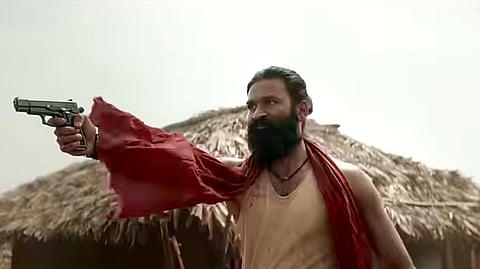Captain Miller review: Dhanush performs brilliantly in this saga of liberation
Captain Miller (Tamil)(3.5 / 5)
Dhanush-starrer Captain Miller gets off to a terrific start with a flawlessly paced first half and a stellar performance from its lead that lacerates your heart. The pre-interval block nearly feels like a complete film until director Arun Matheswaran takes it up several notches in the second half, building up to a final battle of epic proportions.
The film is set in pre-Independence India and Dhanush plays Eesa, soon to become the armed revolutionary Captain Miller.
It is made clear that Eesa is either Dalit or Adivasi. Early on in the film, there is a sequence about being barred from a temple. Soon, an angry Eesa rages at his brother Sengolan (Shiva Rajkumar) who is in the Indepence movement, “Whose freedom are you fighting for? Is it ours? After you win Independence, will they let us into the temple sanctum? You are fighting for the freedom of the landowners. No matter who rules here, we remain enslaved.”
Captain Miller also goes into the difficult history of why lowered caste persons joined the British Colonial Army. As the film points out, the army gave many like Eesa dignity, food on the table, and even the basic right to wear shoes. But it comes at the cost of being brutal enforcers for imperialists while caste supremacy in the army makes its vileness felt more insidiously. Eesa’s transformation into Captain Miller, with this background of trauma and vindication, is superbly executed.
Though director Arun Matheswaran only recently made it official that the film covertly alludes to the real life Vallipuram Vasanthan aka Captain Miller, the first ever Black Tiger of the LTTE, it was already apparent to people familiar with the struggle for Tamil Eelam. Vasanthan came to be known as Miller during his time with the LTTE. After his death while carrying out a suicide attack on a Sri Lankan army garrison in 1987, in Nelliyadi, Jaffna, he earned the title of Captain. The Black Tigers would go on to be the suicide wing of the LTTE during the Sri Lankan Civil War. Miller’s statue has since been desecrated multiple times by the Sinhala army. Even today, Tamils commemorate July 5, the date of Miller’s death, as Karumpuli Naal (Black Tiger Day). While Captain Miller is set in Tamil Nadu in a different time period, the film is peppered with nods to the LTTE. The director has also mentioned that this was his way of being able to tell the story without censure.
The film is a story of land rights, nationhood, the plunder of imperialism and a question: whose freedom struggles are sanctified, whose demonised? A question that echoed across the theatre I was in that exploded with cheers for every scene of butchering the British in retaliation, but remained dishearteningly quiet during Miller’s justified assertions of his caste locality.
However, what Eelam Tamils will feel about the film’s Captain Miller being from Tamil Nadu rather than Thunnalai in Sri Lanka where Vasanthan was born, remains to be seen.
Dhanush’s performance never wavers. The star holds you enthralled by his shifts from an angry young villager to hopeful soldier to armed revolutionary. It can’t be easy for a star so well-known to become a fleshed out character on screen with such ease, that you often forget who is playing him.
Captain Miller also has Siva Rajkumar appearing in another Kollywood cameo after Rajni’s Jailer last year, staying just long enough on screen to keep his fans pleased. His presence provides an interesting twist to the plot. John Kokken as a local prince and caste-supremacist landowner comes off as more caricature than convincing villain. This is especially disappointing given his stunning performance as Vembuli in Sarpatta Parambarai (2021). Priyanka Mohan as princess-turned-freedom fighter Velmathi is equally mediocre. Her attempts at angry, no-nonsense do-gooder feel petulant, particularly because she delivers most of her lines through gritted teeth for some unfathomable reason. Nivedhithaa Sathish as another armed revolutionary who fights alongside Dhanush, delivers a far more satisfying performance in a role unlike very few in Kollywood for women. She’d have been an interesting lead rather than Priyanka if only Tamil cinema wasn’t so determined to centre pale-skinned women actors.
It is however worth noting that the director takes care to present his women characters with strength, dignity and courage — Kollywood really should take note.
GV Prakash delivers a soundtrack that can be considered an extension of the script. His music weaves in and out of the story with thrillingly choreographed precision.
Truth be told, I was concerned that Captain Miller would be another oppression spectacle on the Sri Lankan Civil War made by Tamils who did not have to survive genocide. But Arun Matheswaran delivers a grand saga sweeping across time to hold a mirror to the inequities of today, particularly in relation to caste. Surely few would have expected the film’s strident anti-caste angle, but it is a welcome start to the New Year and Pongal.

